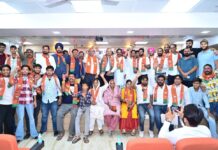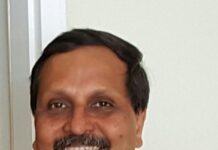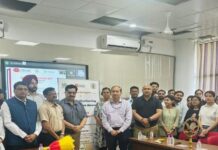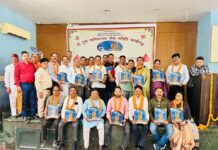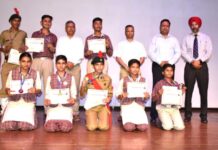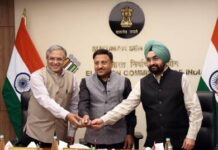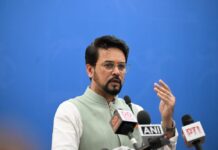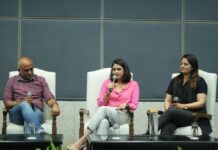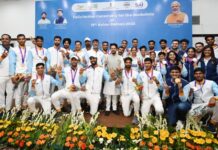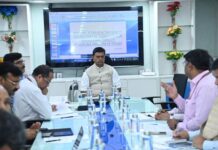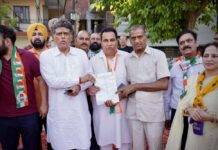Chandigarh September 25, 2020
Virtual Panel Discussion on NEP 2020: “Stakeholders Speak Up” by USOL,PU

University School of Open Learning, Panjab University, Chandigarh organized a virtual panel discussion on the topic “National Education Policy 2020: Stakeholders Speak Up” through cisco-webex to deliberate upon different aspects of NEP 2020.
Prof. Madhurima Verma, Chairperson, USOL, welcomed the resource persons and talked about the rationale and significance of the event while the theme of the webinar was introduced by Mr. Sudhir Baweja, the organising secretary of the event and coordinator of Swami Vivekanand Studies, USOL.
Prof. Viney Kapoor Mehra, Vice-Chancellor, Dr. B.R. Ambedkar
National Law University, Sonipat argued that NEP 2020 answers what was decided in the Geneva Conference 1996, it is rooted in our culture, heritage and values. She also emphasized that it should be called National Education Policy and not new education policy. She argued that it is a student’s friendly policy as it provides enough freedom and flexibility to the students. Moreover, its credit score bank will also help students in saving their precious time if they are not able to complete the degree. She appreciated the emphasis on the use of mother languages in the policy. She argued that NEP gives autonomy to the universities to collaborate with foreign universities which will help India in becoming “Academic Leader”. She emphasized that new education policy should have included medical and legal professional courses as well, as there is immense need of imparting ethical values to students of these disciplines.
Dr. R.C. Sharma, faculty Dr. B.R. Ambedkar University Delhi, referred to section 3.5 of the NEP which is related to State Open Schools and NIOS. He said that NEP aims for higher quality higher education for everyone. He also argued that the policy emphasizes on the significance of distance education institutes in the present scenario as according to the policy, all higher education institutes will have to run ODL as well as e-learning platforms to improve GER and to provide equal access and opportunities for everyone. Besides, he emphasized on the need for both synchronous and asynchronous learning and the benefits of ICT.
The third speaker of the webinar, Prof. Latika Sharma, from Dept. of Education, Panjab University Chandigarh provided an overview of the NEP 2020 from the perspective of a teacher. She emphasized that teacher is the centre of an education system and the policy ensures overall growth and development of teachers as well. She further argued that in the changing scenario where cultural and social transformation is happening rapidly there was a need for a new education policy and the NEP 2020 serves the same as it targets inclusive, equitable and life-long learning . She deliberated upon all the important aspects of the policy such as duration of UG and PG courses, multiple entry and exit points, National Academic Credit Bank etc. But the basic thrust of her argument was how the policy values the role of a teacher. She touched upon various aspects of the policy with regard to teachers such as the recruitment and deployment of teachers, transfer policy, criteria for selection and promotion, pool of teachers, career progression etc. She also added that with the provision of hiring local eminent experts as master instructors, the policy aims to preserve the local cultures of India. The thrust of her deliberation was that the policy provides autonomy and more room for creativity to teachers.
Prof. Kuldeep Puri as the moderator of the panel discussion deliberated on the promises and challenges of the NEP 2020 and how a roadmap needs to be created for its better implementation. Prof. Neeru, the event coordinator and co-ordinator, Dept. of Hindi, USOL proposed a vote of thanks by appreciating one and all who contributed and participated in the discussion. The programme was concluded by comments of Mr. Baweja.
Press Release No. 9924
Renuka B. Salwan(DPR)
Punjabi Translation
ਨਵੀਂ ਸਿਖਿਆ ਨੀਤੀ ਉੱਪਰ ਵਿਚਾਰ ਚਰਚਾ
ਪੰਜਾਬ ਯੂਨੀਵਰਸਿਟੀ ਦੇ ਓਪਨ ਲਰਨਿੰਗ ਸਕੂਲ ਵਲੋਂ ਨਵੀਂ ਸਿੱਖਿਆਂ ਨੀਤੀ 2020 ਬਾਰੇ ਵਿਚਾਰ ਵਟਾਂਦਰਾ ਵਰਚੁਅਲ ਮਧਿਅਮ ਰਾਹੀਂ ਆਯੋਜਿਤ ਕੀਤਾ ਗਿਆ। ਪ੍ਰੋ ; ਮਧੁਰਿਮਾ ਵਰਮਾ, ਚੇਅਰਪਰਸਨ ਯੂਸੋਲ ਨੇ ਵਿਚਾਰ ਚਰਚਾ ਮੰਡਲੀ ਅਤੇ ਵਿਚਾਰ ਚਰਚਾ ਦੇ ਵਿਸ਼ੇ ਨਾਲ ਜਾਣ ਪਛਾਣ ਕਰਵਾਈ। ਇਸ ਮੌਕੇ ਪ੍ਰੋ; ਵਿਨੈ ਕਪੂਰ ਮਹਿਰਾ ਵਾਈਸ ਚਾਂਸਲਰ, ਬੀ, ਆਰ, ਅੰਬੇਦਕਰ ਰਾਸ਼ਟਰੀ ਕਾਨੂੰਨ ਯੂਨੀਵਰਸਿਟੀ, ਸੋਨੀਪਤ ਨੇ ਨਵੀਂ ਸਿੱਖਿਆਂ ਨੀਤੀ ਨੂੰ ਲੰਬੀ ਉਡੀਕ ਮਗਰੋਂ ਆਈ ਨੀਤੀ ਦੱਸਿਆ। ਉਹਨਾਂ ਜਨੇਵਾ ਕਾਨਫਰੰਸ 1996 ਦੇ ਹਵਾਲੇ ਨਾਲ ਕਿਹਾ ਕਿ ਸਿੱਖਿਆਂ ਦੀ ਜੜ੍ਹ ਸੱਭਿਆਚਾਰ ਵਿੱਚ ਹੋਣੀ ਚਾਹੀਂਦੀ ਹੈ, ਅਤੇ ਨਵੀਂ ਸਿੱਖਿਆਂ ਨੀਤੀ ਇਸ ਗੱਲ ਉੱਪਰ ਖਰੀ ਉਤਰਦੀ ਹੈ। ਇਹ ਸਿੱਖਿਆਂ ਨੀਤੀ ਲੰਬੀ ਪ੍ਰਕਿਰਿਆਂ ਰਾਹੀਂ ਘੜੀ ਗਈ ਹੈ। ਇਸ ਨੂੰ ਘੜਨ ਲਈ ਹਰੇਕ ਉਸ ਆਖਰੀ ਬੰਦੇ ਦੀ ਸਲਾਹ ਲਈ ਗਈ ਹੈ, ਜਿਸਦਾ ਸਿੱਖਿਆਂ ਨਾਲ ਕੋਈ ਨਾ ਕੋਈ ਸੰਬੰਧ ਜੁੜਦਾ ਹੈ। ਇਹ ਨੀਤੀ ਵਿਦਿਆਰਥੀਆ ਨੂੰ ਚੋਣ ਦੇ ਮੌਕੇ ਦਿੰਦੀ ਹੈ। ਇਸ ਨੀਤੀ ਤਹਿਤ ਕਿਸੇ ਵੀਂ ਸਮੇਂ ਦਾਖਲੇ ਅਤੇ ਕੋਰਸ ਨੂੰ ਛੱਡਣ ਦੀ ਖੁੱਲ੍ਹ ਦਿੱਤੀ ਗਈ ਹੈ। ਇਸ ਨੀਤੀ ਵਿੱਚ ਅੰਤਰ -ਅਨੂਸ਼ਾਸਨੀ ਪਹੁੰਚ ਉੱਪਰ ਜ਼ੋਰ ਦਿੱਤਾ ਗਿਆ ਹੈ। ਕੋਈ ਵੀ ਵਿਦਿਆਰਥੀ ਸ਼ੋਸਲ ਸਾਇੰਸ ਪੜ੍ਹਨ ਦੇ ਨਾਲ-ਨਾਲ ਕਲਾ ਜਾਂ ਵਿਗਿਆਨ ਦੇ ਵਿਸ਼ਿਆ ਦੀ ਵੀ ਚੋਣ ਕਰ ਸਕਦਾ ਹੈ। ਇਸ ਨੀਤੀ ਵਿੱਚ ਮਾਂ ਬੋਲੀ ਅਤੇ ਸੰਸਕ੍ਰਿਤ ਭਾਸ਼ਾ ਨੂੰ ਬਣਦਾ ਸਤਿਕਾਰ ਦਿੱਤਾ ਗਿਆ ਹੈ। ਉਹਨਾਂ ਵਾਤਾਵਰਨ ਦੇ ਮੁੱਦੇ ਉੱਪਰ ਦੁਨੀਆਂ ਦੇ ਇੱਕਜੁੱਟ ਹੋਣ ਅਤੇ ਭਾਰਤ ਵਲੋਂ ਦੁਨੀਆ ਦੀ ਆਤਮਿਕ ਵਿਕਾਸ ਵਿੱਚ ਅਗਵਾਈ ਕਰਨ ਦੀ ਵਿਵੇਕਾਨੰਦ ਦੀ ਸਿੱਖਿਆ ਦੇ ਤੱਤ ਵੀ ਨਵੀਂ ਸਿੱਖਿਆ ਨੀਤੀ ਵਿੱਚੋਂ ਨਸ਼ਰ ਹੁੰਦੇ ਦਰਸਾਏ। ਉਹਨਾਂ ਕਾਨੂੰਨ ਅਤੇ ਮੈਡੀਕਲ ਦੀ ਸਿੱਖਿਆ ਨੂੰ ਇੱਕਠੇ ਨਾ ਕਰਨ ਬਾਰੇ ਇਤਰਾਜ ਜਤਾਇਆ।
ਦੂਜੇ ਬੁਲਾਰੇ ਪ੍ਰੋ; ਆਰ. ਸੀ. ਸ਼ਰਮਾ, ਬੀ.ਆਰ. ਅੰਬੇਦਕਰ ਯੂਨੀਵਰਸਿਟੀ ਦਿੱਲੀ ਨੇ ਸਿੱਖਿਆਂ ਨੂੰ ਦੇਸ਼ ਦੀ ਉਨਤੀ ਵਿੱਚ ਅਣਦਿਸਦਾ ਪੁਲ ਦੱਸਿਆ ਜੋ ਸੰਕਟ ਦੇ ਸਮੇਂ ਵੀ ਅਡਿੱਗ ਰਹਿੰਦਾ ਹੈ। ਉਨ੍ਹਾਂ ਸਮਾਜਕ ਅਤੇ ਆਰਥਿਕ ਪੱਖੋਂ ਕਮਜ਼ੋਰ ਤਬਕਿਆਂ ਦੀ ਸਿੱਖਿਆ ਵਿੱਚ ਭਾਗੀਦਾਰੀ ਲਈ,ਓਪਨ ਅਤੇ ਦੂਰਵਰਤੀ ਪ੍ਰਣਾਲੀ ਰਾਹੀਂ ਲਗਾਤਾਰ ਉਮਰ ਭਰ ਸਿੱਖਿਆ ਅਤੇ ਬਲੈਂਡਡ ਸਿੱਖਿਆਂ ਬਾਰੇ ਚਰਚਾ ਕੀਤੀ। ਉਹਨਾਂ ਖੁੰਬਾਂ ਵਾਂਗ ਪੈਦਾ ਹੋ ਰਹੇ ਆਨਲਾਈਨ ਕੋਰਸਾਂ ਦਾ ਵੀ ਆਲੋਚਨਾਤਮਕ ਵਿਸ਼ਲੇਸਣ ਕੀਤਾ। ਉਹਨਾਂ ਦੂਰਵਰਤੀ ਅਤੇ ਉਪਨ ਸਿੱਖਿਆਂ ਦੀਆ ਚੁਣੋਤੀਆਂ ਬਾਰੇ ਵੀ ਚਰਚਾ ਕੀਤੀ । ਉਨ੍ਹਾਂ ਡਿਜੀਟਲ ਅਸਮਾਨਤਾ, ਬਲੈਕ ਬਾਕਸ ਟੀਚਿੰਗ ਬਾਰੇ ਚਰਚਾ ਕਰਦਿਆਂ ,ਨਵੀਂ ਵਿਕਸਿਤ ਹੋ ਰਹੀ ਤਕਨੀਕ ਨਾਲ ਬਰ-ਮੇਚਣ ਲਈ ਤਿਆਰ ਹੋਣ ਦੀ ਗੱਲ ਕਹੀ।
ਇਸ ਵਿਚਾਰ ਚਰਚਾ ਦੇ ਤੀਜੇ ਮਾਹਿਰ ਪ੍ਰੋ; ਲਤਿਕਾ ਸ਼ਰਮਾ, ਪੰਜਾਬ ਯੂਨੀਵਰਸਿਟੀ ਨੇ ਨਵੀਂ ਸਿੱਖਿਆਂ ਨੀਤੀ ਵਿੱਚ ਅਧਿਆਪਕ ਅਤੇ ਆਧਿਆਪਕ ਸਿੱਖਿਆਂ ਬਾਰੇ ਚਰਚਾ ਕੀਤੀ। ਉਹਨਾਂ ਕਿਹਾ ਕਿ ਇਸ ਨੀਤੀ ਵਿੱਚ ਅਧਿਆਪਕਾਂ ਦੇ ਪੁਰਾਣੇ ਰੁਤਬੇ ਨੂੰ ਬਹਾਲ ਕਰਨ ਦੀ ਗੱਲ ਕਹੀ ਗਈ ਹੈ। ਅਧਿਆਪਕਾਂ ਦੀ ਟ੍ਰੇਨਿੰਗ ਲਈ ਚਾਰ ਸਾਲਾ ਏਕੀਕਿਤ ਬੀ. ਐਡ. ਕੋਰਸ ਨੂੰ ਉਹਨਾਂ ਨਵੀਂ ਸਿੱਖਿਆਂ ਨੀਤੀ ਦਾ ਚੰਗਾ ਪਹਿਲੂ ਦੱਸਿਆ। ਉਹਨਾਂ ਅੰਗਰੇਜੀ ਭਾਸ਼ਾ ਦਾ ਸਿੱਖਿਆਂ ਉੱਪਰੋਂ ਗਲਬਾ ਘੱਟ ਕਰਨ ਨੂੰ ਵੀ ਸਹੀ ਕਦਮ ਕਿਹਾ। ਸਾਰੀ ਵਿਚਾਰ ਚਰਚਾ ਦਾ ਸੰਚਾਲਨ ਪ੍ਰੋ; ਕੁਲਦੀਪ ਪੁਰੀ, ਸਿੱਖਿਆ ਵਿਭਾਗ ਯੂਸੋਲ ਨੇ ਕੀਤਾ । ਉਹਨਾਂ ਸਿੱਖਿਆ ਨੀਤੀ ਬਾਰੇ ਆਪਣੀਆਂ ਆਲੋਚਨਾਤਮਕ ਟਿੱਪਣੀਆ ਰਾਹੀਂ ਸਾਰੀ ਚਰਚਾ ਨੂੰ ਸੂਤਰਬੱਧ ਕੀਤਾ। ਸ੍ਰੀ ਸੁਧੀਰ ਬਵੇਜਾ, ਨੇ ਸ਼ੁਰੂ ਅਤੇ ਅਖੀਰ ਵਿੱਚ ਆਪਣੇ ਨਿਵੇਕਲੇ ਅੰਦਾਜ਼ ਵਿੱਚ ਵਿਚਾਰ ਚਰਚਾ ਦਾ ਸੰਚਾਲਨ ਕੀਤਾ। ਪ੍ਰੋ; ਨੀਰੂ ਹਿੰਦੀ ਵਿਭਾਗ ਯੂਸੋਲ ਨੇ ਧੰਨਵਾਦ ਦਾ ਮਤਾ ਪੇਸ਼ ਕੀਤਾ । ਇਸ ਮੌਕੇ ਸ੍ਰੀ ਸੁੱਚਾ ਸਿੰਘ ਨੇ ਸੰਚਾਲਨ ਦੀ ਤਕਨੀਕੀ ਜਿੰਮੇਵਾਰੀ ਨੂੰ ਚੰਗੇ ਤਰੀਕੇ ਨਾਲ ਨਿਭਾਇਆ।
Hindi Translation



